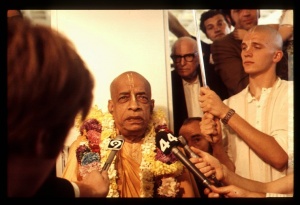CC Adi 5.77: Difference between revisions
m (1 revision(s)) |
No edit summary |
||
| Line 1: | Line 1: | ||
{{ | [[Category:Sri Caitanya-caritamrta - Adi-lila Chapter 05|C077]] | ||
<div style="float:left">'''[[Sri Caitanya-caritamrta|Śrī Caitanya-caritāmṛta]] - [[CC Adi|Ādi-līlā]] - [[CC Adi 5|Chapter 5: The Glories Of Lord Nityānanda Balarāma]]'''</div> | |||
<div style="float:right">[[File:Go-previous.png|link=CC Adi 5.76|Ādi-līlā 5.76]] '''[[CC Adi 5.76|Ādi-līlā 5.76]] - [[CC Adi 5.78|Ādi-līlā 5.78]]''' [[File:Go-next.png|link=CC Adi 5.78|Ādi-līlā 5.78]]</div> | |||
{{CompareVersions|CC|Adi 5.77|CC 1975|CC 1996}} | |||
{{RandomImage}} | |||
==== TEXT 77 ==== | ==== TEXT 77 ==== | ||
<div | <div class="verse"> | ||
viṣṇos tu trīṇi rūpāṇi | :viṣṇos tu trīṇi rūpāṇi | ||
puruṣākhyāny atho viduḥ | :puruṣākhyāny atho viduḥ | ||
ekaṁ tu mahataḥ sraṣṭṛ | :ekaṁ tu mahataḥ sraṣṭṛ | ||
dvitīyaṁ tv aṇḍa-saṁsthitam | :dvitīyaṁ tv aṇḍa-saṁsthitam | ||
tṛtīyaṁ sarva-bhūta-sthaṁ | :tṛtīyaṁ sarva-bhūta-sthaṁ | ||
tāni jñātvā vimucyate | :tāni jñātvā vimucyate | ||
</div> | </div> | ||
| Line 16: | Line 20: | ||
==== SYNONYMS ==== | ==== SYNONYMS ==== | ||
<div | <div class="synonyms"> | ||
''viṣṇoḥ''—of Lord Viṣṇu; ''tu''—certainly; ''trīṇi''—three; ''rūpāṇi''—forms; ''puruṣa-ākhyāni''—celebrated as the ''puruṣa''; ''atho''—how; ''viduḥ''—they know; ''ekam''—one of them; ''tu''—but; ''mahataḥ sraṣṭṛ''—the creator of the total material energy; ''dvitīyam''—the second; ''tu''—but; ''aṇḍa-saṁsthitam''—situated within the universe; ''tṛtīyam''—the third; ''sarva-bhūta-stham''—within the hearts of all living entities; ''tāni''—these three; ''jñātvā''—knowing; ''vimucyate''—one becomes liberated. | |||
</div> | </div> | ||
| Line 23: | Line 27: | ||
==== TRANSLATION ==== | ==== TRANSLATION ==== | ||
<div | <div class="translation"> | ||
“Viṣṇu has three forms called puruṣas. The first, Mahā-Viṣṇu, is the creator of the total material energy [mahat], the second is Garbhodaśāyī, who is situated within each universe, and the third is Kṣīrodaśāyī, who lives in the heart of every living being. He who knows these three becomes liberated from the clutches of māyā.” | “Viṣṇu has three forms called puruṣas. The first, Mahā-Viṣṇu, is the creator of the total material energy [mahat], the second is Garbhodaśāyī, who is situated within each universe, and the third is Kṣīrodaśāyī, who lives in the heart of every living being. He who knows these three becomes liberated from the clutches of māyā.” | ||
</div> | </div> | ||
| Line 30: | Line 34: | ||
==== PURPORT ==== | ==== PURPORT ==== | ||
<div | <div class="purport"> | ||
This verse appears in the Laghu-bhāgavatāmṛta (Pūrva 2.9), where it has been quoted from the Sātvata-tantra. | This verse appears in the ''Laghu-bhāgavatāmṛta'' (Pūrva 2.9), where it has been quoted from the ''Sātvata-tantra''. | ||
</div> | </div> | ||
__NOTOC__ | |||
<div style="float:right; clear:both;">[[File:Go-previous.png|link=CC Adi 5.76|Ādi-līlā 5.76]] '''[[CC Adi 5.76|Ādi-līlā 5.76]] - [[CC Adi 5.78|Ādi-līlā 5.78]]''' [[File:Go-next.png|link=CC Adi 5.78|Ādi-līlā 5.78]]</div> | |||
__NOTOC__ | |||
__NOEDITSECTION__ | |||
Revision as of 18:57, 21 August 2021

A.C. Bhaktivedanta Swami Prabhupada
TEXT 77
- viṣṇos tu trīṇi rūpāṇi
- puruṣākhyāny atho viduḥ
- ekaṁ tu mahataḥ sraṣṭṛ
- dvitīyaṁ tv aṇḍa-saṁsthitam
- tṛtīyaṁ sarva-bhūta-sthaṁ
- tāni jñātvā vimucyate
SYNONYMS
viṣṇoḥ—of Lord Viṣṇu; tu—certainly; trīṇi—three; rūpāṇi—forms; puruṣa-ākhyāni—celebrated as the puruṣa; atho—how; viduḥ—they know; ekam—one of them; tu—but; mahataḥ sraṣṭṛ—the creator of the total material energy; dvitīyam—the second; tu—but; aṇḍa-saṁsthitam—situated within the universe; tṛtīyam—the third; sarva-bhūta-stham—within the hearts of all living entities; tāni—these three; jñātvā—knowing; vimucyate—one becomes liberated.
TRANSLATION
“Viṣṇu has three forms called puruṣas. The first, Mahā-Viṣṇu, is the creator of the total material energy [mahat], the second is Garbhodaśāyī, who is situated within each universe, and the third is Kṣīrodaśāyī, who lives in the heart of every living being. He who knows these three becomes liberated from the clutches of māyā.”
PURPORT
This verse appears in the Laghu-bhāgavatāmṛta (Pūrva 2.9), where it has been quoted from the Sātvata-tantra.